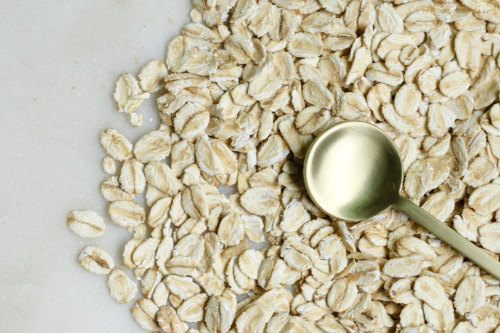If you've ever had an eye on high cholesterol, that cozy bowl of goodness—yes, oatmeal!—may deliver two unique advantages to your cardiac wellness.
Oatmeal: It’s one of those foods you love, and that’s good for you. If you’ve ever heard that oatmeal’s a solid pick for your heart but maybe didn’t understand quite why that is, you might be intrigued to learn this little-known insight about what might make oats so powerful for your cardiovascular health.
BREAKING: 1 Cup of This Melts Belly and Arm Fat (Take Before Bed)
For the 2,000 years we humans have been eating (and loving) oats, we’ve unearthed a lot of wisdom about this beloved grain’s health benefits. Yes, oatmeal takes a wholesome edge off your hunger and pairs with more fruits, nuts, and other add-ins than most dishes you can probably think of.
But also, for the 94 million U.S. adults with high cholesterol (per to the Centers for Disease Control and Prevention‘s benchmarks), there are two particular compounds in oatmeal that could help you reach a healthier cholesterol level.
Our inquiry into the effect of oatmeal on heart health started when a dietitian tipped us off to a somewhat mysterious antioxidant that’s found exclusively in oats: Avenanthramide. In the past few decades, avenanthramide (pronounced phonetically, with a long i on the last syllable) has gained interest among the nutrition and cardiology communities. That’s because some research shows avenanthramide may offer a range of health benefits, some of which pertain specifically to heart health and concerning cholesterol levels. Some research has suggested that avenanthramide may help lower low-density lipoprotein cholesterol—better known as “LDL,” or “bad” cholesterol.
But the conversation about avenanthramides leads to another important point about oatmeal: The presence of beta-glucans, which are demonstrated to have significant effect on your cardiovascular health. Here, we explore the possible benefits of avenanthramide and beta-glucans, among other heart-healthy effects of oatmeal.
What is avenanthramide?
Avenanthramides (also known as “polyphenolic amides”) are a group of antioxidants classified as polyphenols. Polyphenols are powerful micronutrients found in some natural foods and drinks, like grapes, green tea, wine, red fruits, and coffee. (Who knew wine and oatmeal had such an impressive trait in common… brunch, anyone?)
What’s interesting about avenanthramides is that they’re relatively under the radar, and science suggests oatmeal is the only food in which they’ve been identified, including in oat bran, oat leaves, and oat germinating seeds. How do they work? As leaders at the National Heart, Lung, and Blood Institute (NHLBI) acknowledge: “Avenanthramide is a phytochemical found in oats that may have antioxidant properties and anti-inflammatory effects.”
Currently, research into the health impacts of avenanthramides is preliminary, and relatively limited. The NHLBI notes that more research in this area is needed… but for exploration’s sake, here’s what science currently says about oatmeal and your heart.
Can avenanthramides improve cholesterol levels?
Experts with the NHLBI pointed to one 2011 study in China which demonstrated that daily supplementation with oat avenanthramide capsules of 3.12 milligrams daily for one month significantly decreased total cholesterol by 11.1 percent, triglycerides by 28.1 percent, and low-density lipoprotein cholesterol by 15.1 percent in 120 healthy subjects.
Here’s an important point: The researchers noted these effects could have been thanks to another source, called beta-glucans, a type of soluble fiber found in oats.
The researchers also mentioned that while polyphenols have shown demonstrated heart health benefits, the levels of avenanthramides found in oats are not high enough to assume consuming them in oats will yield these benefits. Yumin Chen, chair of the Cereals & Grains Association’s Oat and Barley Technical Committee, says that the avenanthramide content in oats is roughly 20 parts per million (ppm)—a very low level in comparison to other dietary polyphenol sources with established health benefits such as tea, coffee, fruits.
Adds Kelly LeBlanc, MLA, RD, LDN, director of nutrition at Oldways: “[…A] study published in 2018 concluded that ‘mean avenanthramide intake among oat consumers ranges from 0.3 to 2.1 [milligrams per day], considerably lower than the amount used in studies that have investigated biological effects of avenanthramides in humans.'”
Oatmeal and your cholesterol
According to the experts, there is an abundance of research to support the idea that consuming whole grain oats and oatmeal is very good for your cholesterol levels, primarily due to these beta-glucans. “[Beta-glucans are] considered to be the major active component of oats contributing to its cholesterol-lowering and antidiabetic effects,” say experts with the NHLBI.
LeBlanc says the evidence for soluble beta-glucans fiber’s impact on cholesterol is so strong and consistent that the FDA has approved a health claim that oats can help lower cholesterol and reduce the risk of coronary heart disease. “A study analyzing 24 randomized controlled trials found that eating whole grains is associated with lower LDL ‘bad’ cholesterol and total cholesterol, and that whole grain oats specifically seemed to be linked with the greatest cholesterol-lowering effects compared to other whole grain foods,” she says.
But precisely how do beta-glucans lower cholesterol levels? “Beta-glucans can directly bind to cholesterol, inhibiting its absorption,” says Chen.
How much oats or oatmeal do you need to eat to get heart benefits?
The experts say it’s rather difficult to calculate precisely how much oatmeal you need to eat to receive their associated heart and general health benefits. But, LeBlanc says, The Dietary Guidelines for Americans recommends whole grains should compose at least half our daily grain intake. She says for most adults, that means a half-cup of cooked oatmeal could count for one of the three to four whole grain servings (out of the total six to eight grain servings) recommended per day.
The United States Food and Drug Administration (FDA) suggests consuming three grams or more of beta-glucans from oats or barely each day may reduce the risk of coronary heart disease (CHD).
What type of oats should you eat for better cholesterol?
The experts say really any type of oat, as long as it is whole oats and not heavily processed, has health benefits. But Karen Graham, RD, CDE, says slower-cooking types of oatmeal in a more whole, unprocessed form are the healthiest (think steel-cut oats or large-flake oats, Graham says).
The nutrition professionals we spoke with added that it’s important to stay away from oat products with added sugars, fat, artificial flavors, preservatives, and oils.
How fast does oatmeal lower cholesterol?
According to the experts, there is not set amount of time that it takes for the beta-glucan in oats, and potentially other beneficial nutrients found in oats, to improve cholesterol levels.
However, several studies found that eating oats for around a month or more seemed to have positive benefits. In one 2017 study, people who ate 70 grams (2.5 ounces) of oatmeal twice daily for four weeks experienced an 8.1 percent reduction in their total cholesterol levels, and an 11.6 percent reduction in their low-density lipoprotein (LDL) levels.
How else does oatmeal benefit the heart?
According to the experts, aside from oatmeal’s possible cholesterol-reducing effects, consuming oats can also help reduce blood pressure, reduce the risk of plaques forming in blood vessels, and reduce the risk of other conditions that raise the risk of heart disease, such as obesity, diabetes, and lung disease.
TRENDING: Shed 42 lbs In 30 Days With This Simple Night-time Pill
Says dietitian Graham: “If I were to pick one type of food of greatest benefit to reducing your risk for heart disease, it would be high fiber foods. In this group are vegetables and fruits and whole grains, which yes, include oats!”
What other health benefits does oatmeal have?
According to the experts, eating oats and oatmeal can contribute to good health several different ways. “A 2020 study in BMJ found that people who eat oatmeal at least twice per week have a 21 percent lower risk of developing type 2 diabetes than those who eat oatmeal less than once per month, even after adjusting for other lifestyle factors,” says LeBlanc.
Graham says the fiber found in oats can also help with maintaining regular bowel movements. “When we prevent constipation, we reduce our risk of a long line of disorders such as bowel cancer, diverticulosis, and hemorrhoids,” she explains.
Oats also contain a long list of vitamins and minerals that contribute to good health, including:
- fiber
- protein
- riboflavin (vitamin B2)
- niacin (vitamin B3)
- folate (vitamin B9)
- thiamin (vitamin B1)
- pantothenic acid
- vitamin B6
- vitamin E
- vitamin C
- vitamin K
- calcium
- iron
- magnesium
- phosphorous
- potassium
- zinc
- copper
- manganese
- omega 3 and 6 fatty acids









